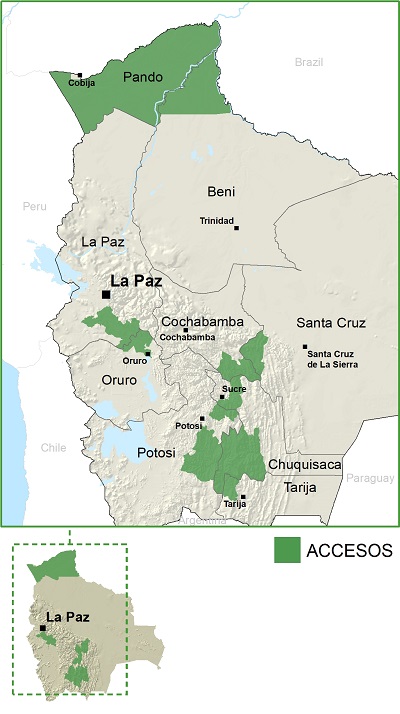Economic Inclusion Programme for Families and Rural Communities in the Territory of the Plurinational State of Bolivia (ACCESOS)
IFAD Asset Request Portlet
Asset Publisher
Economic Inclusion Programme for Families and Rural Communities in the Territory of Plurinational State of Bolivia
This programme will strengthen the capacities of communal and territorial landholders and autonomous local governments, in alliance with other organizations and local institutions.
Specifically, it will support the community-based implementation of farming systems adapted to the widely varying conditions of high plateaux, inter-Andean valleys and some lowland areas.
In addition, ACCESOS will cofinance the development of self-organized community enterprises to connect producers with markets and create economic alternatives in the rural non-agricultural sector. It will particularly focus on women and young people. The programme will also promote broad-based access to financial services, including savings, credit and insurance.
ACCESOS targets rural municipalities that are among the poorest in the country and cover vast and diverse geographical areas, including La Paz, Oruro and Potosí; Cochabamba, Chuquisaca and Tarija; and Santa Cruz, Beni and Pando. The target area has a combined rural population of Quechua, Aymara and campesino households characterized by high levels of poverty or extreme poverty. The territories include a wide variety of ecosystems with fragile, threatened or degraded natural resources.
Key programme goals include:
- Greater sustainability, productivity and food security for small-scale rural producers
- Higher incomes from diversification of the rural economy
- Greater gender equity through increased access to training, investment capital, credit and other financial services
- Inclusion of poor and extremely poor families in viable economic alternatives
- Greater institutional and organizational capacities to manage natural resources
- Increased capacity to monitor, evaluate and apply lessons learned in development
- Improved resilience to the effects of climate change, particularly for collective landholders.
The target group comprises around 32,000 mainly food-insecure, poor rural households, or roughly 24 per cent of the total population in the programme area.

President's reports
Project design reports
Project design reports
Supervision and implementation support documents
Supervision and implementation support documents
Misión de supervisión - abril 2018
Informe de supervisión, agosto 2017
Environmental and social impact assessment
Final environmental and social management framework
Interim (mid-term) review report
Interim (mid-term) review report
Resettlement action framework
PCR digest
Special study
Project list
Audit and Financial Statements
Audit and Financial Statements
Project completion report
Project completion report
Co-financiers
Related
Related
Bolivia: The Economic Inclusion Programme for Families and Rural Communities (ACCESOS)
The Adaptation for Smallholder Agriculture Programme (ASAP) piloted talking maps in Bolivia. This innovative tool brings together science and traditional community knowledge to identify key issues and adaptation priorities, giving Indigenous Peoples, women and youth a voice in decision-making.